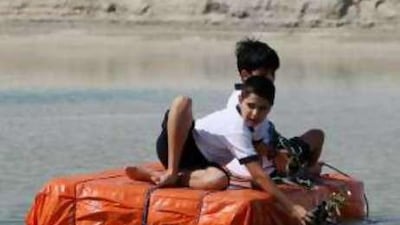Parents are being urged to get their children out of the house and out of the malls to play in the outdoors. Distracted by entertainment in malls and computer games, young people could be losing a vital link with nature, said Ali Saqar al Suweidi, president of the Emirates Marine Environmental Group. The group is campaigning to encourage parents and teachers to ensure the natural world, especially marine life, is part of all children's upbringing and education.
"Not many children are aware of what is outside the classroom or the mall," Mr Suweidi said. "Some children never saw fish or crabs or algae, and they are from their own country." The UAE has about 50 square kilometres of mangroves, which absorb carbon dioxide and provide a habitat for many species of birds, crabs and fish. They are also nurseries and shelters for shrimp and other fish of commercial value such as snappers, grunts and sea bream. The country's coral reefs survive in harsh conditions and hold fascinating secrets for scientists.
But sea life is a mystery to most young people, Mr Suweidi said. He had even met college students of environmental sciences who didn't know how to swim, he said. Only one child in four takes formal swimming lessons and most cannot swim the length of a pool, according to research among pupils aged 13 to 19 conducted by UAE University in Al Ain. Environmental education should start at a young age. "If we educate them how to take care of the environment, we will be safe for the future."
Mr Suweidi was speaking as more than 80 fifth-graders ran around the environment group's reserve in Ghantoot. They had a scavenger hunt list of animals and plants to photograph as part of an environmental awareness programme. Other activities included planting mangroves and feeding orange-spotted grouper, popularly known as hamour. The fish, which live in a pond at the facility, have been extensively overfished.
The children, from the American International School in Abu Dhabi, appeared to be having fun. This sort of lesson is particularly effective when it takes place in the open air, said Rima Jabado, the group's marine programme director. "They gain a lot more when they are out in the field doing things. This is at the age when you can make a difference. The earlier you start with environmental education, the more likely you are to change behaviour."
The Ghantoot facility, which is open to adults as well as children, also offers bird watching, visits to turtle nests and a pearl diving camp in summer. Children visit almost daily in the cooler months, Ms Jabado said. Many countries are now developing environmental education programmes to bring up a more aware young generation. In Australia, there are plans to have every secondary and primary school equipped with solar power generation equipment by 2015 and to include conservation initiatives in the curriculum.
Similar plans have been announced in Dubai by the Knowledge and Human Development Authority, but there are no formal environmental education initiatives. Group outings among nature, for example, are organised on the initiative of individual teachers. @Email:vtodorova@thenational.ae Are there enough outdoor activities offered for youth? Have your say at www.thenational.ae/yourview

